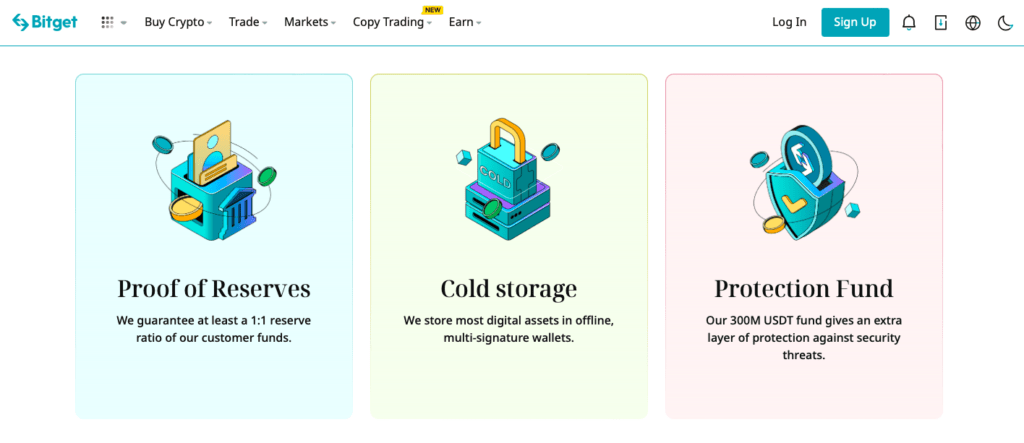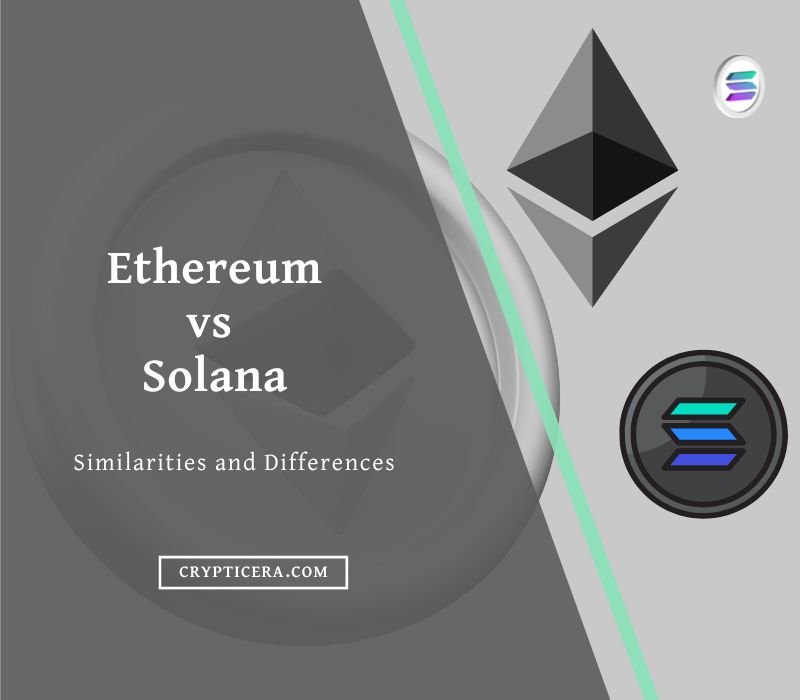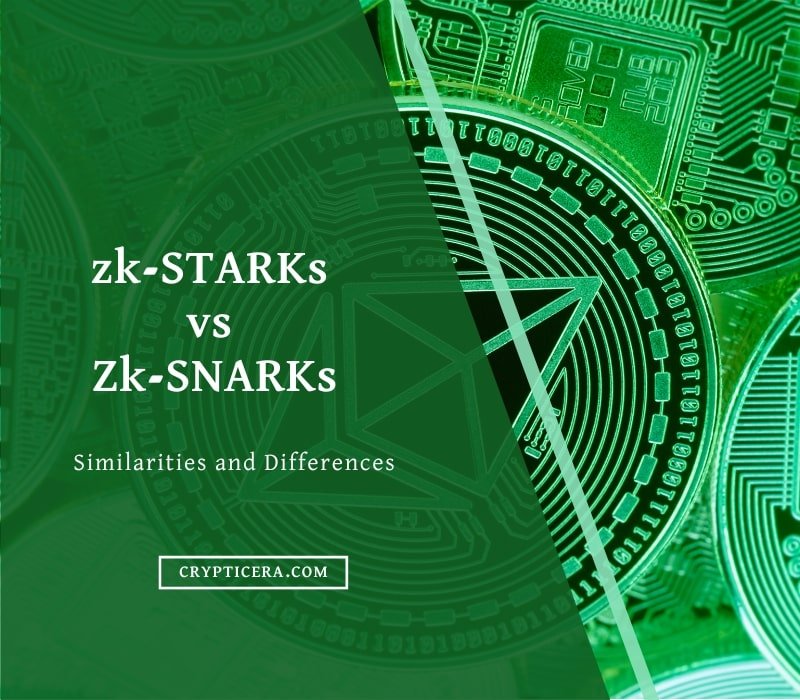The world of cryptocurrency exchanges is heating up with new platforms emerging all the time. Bitget and Phemex promise to make crypto trading smarter, faster, and cheaper than ever before.
Bitget vs Phemex, which crypto exchange reigns supreme? This question has likely crossed the mind of many a trader venturing into the wild world of cryptocurrency exchanges.
Bitget is ideal for derivative traders looking to confidently dive into major cryptocurrencies. With zero fees on deposits, withdrawals, transactions, spot trading, super-fast speeds, and a drool-worthy selection of over 400 cryptocurrencies, it caters to diversity. Want to trade BTC, ETH, LTC, and Altcoins? Bitget’s got you covered.
Phemex aims to provide the ideal spot trading experience with low fees, ample security, and a stockpile of crypto gems.
In this article, we will be comparing Bitget and Phemex in terms of their features, fees, security, user interface, mobile app, and customer support, to help you make an informed decision when choosing between the two.
Quick Verdict:
- Bitget is better than Phemex due to more trading features including Spot, Futures, Perpetual, Dual Investment, Staking, and Copy Trading.
- Bitget is Globally available, whereas Phemex is restricted in some countries due to regulations.
- Phemex offers more Payment methods and Low futures contract fees of 0.01 – 0.06% per trade.
- Bitget Offers strategy trading, where traders can create their custom strategies, while Phemex does not.
Comparison between Bitget and Phemex
| Key Points | BitGet | Phemex |
|---|---|---|
| Year Founded | 2018 | 2019 |
| Founders | Sandra Lou | Jack Tao, Zhou Ting |
| Headquarters | Seychelles | Singapore |
| Exchange Type | Spot and Derivatives Exchange | Cryptocurrency Derivatives Exchange |
| Supported Cryptocurrencies | 400+ | 210+ |
| Trading Pairs | Over 620 trading pairs | Over 300 trading pairs |
| Leverage Options | Up to 125x | Up to 100x |
| Security Features | SSL encryption, 2-factor authentication | SSL encryption, 2-factor authentication, cold wallet storage, DDoS protection |
| Trading Fees | 0.1% maker/taker 0.02% – 0.6% futures fees | 0.1% maker/taker 0.01- 0.6% futures fees |
| KYC Requirements | Not Mandatory | Mandatory KYC verification for withdrawals |
| Regulation | Not Regulated | Registered and regulated by the Monetary Authority of Singapore (MAS) |
| Availability | Global | Restricted access to residents of certain countries |
| Review | Bitget Review | Phemex Review |
BitGet and Phemex are both cryptocurrency derivatives exchanges that offer leverage trading options. bitGet was founded in 2018, while Phemex was founded in 2019.
Both exchanges support popular cryptocurrencies like Bitcoin, Ethereum, and Ripple, with bitGet offering over 600+ trading pairs and Phemex offering over 300 trading pairs. Both exchanges have robust security features such as SSL encryption and 2-factor authentication,
Bitget vs Phemex: Features Comparison
Trading Platform
Both Bitget and Phemex offer a range of features to their users. Bitget offers perpetual contracts, spot trading, and futures trading, among others, while Phemex offers perpetual contracts, spot trading, and margin trading, among others.
Both exchanges offer leverage trading, with Bitget offering up to 125x leverage and Phemex offering up to 100x leverage on BTC contracts and up to 20x leverage on other contracts.
Bitget also offers a social trading feature, where users can follow and copy the trades of successful traders on the platform.
Here are the Similarities and Difference between Bitget and Phemex based on Features:
| Bitget | Phemex | |
|---|---|---|
| Spot Trading | ✓ | ✓ |
| Futures and Perpetual | ✓ | ✓ |
| Margin Trading | ✓ | ✓ |
| Copy Trading | ✓ | ✓ |
| P2P Trading | ✓ | ✓ |
| Strategy Trading (Trading bots) | ✓ | ❌ |
| Staking and Earn | ✓ | ✓ |
| Dual Investment | ✓ | ❌ |
| Launchpad | ✓ | ✓ |
Read: Best Perpetual DEXs
Fees Comparison
Fees are an important consideration when choosing a cryptocurrency exchange. Bitget charges a taker fee of 0.1% and a maker fee of 0.1%. Makers also receive a rebate for providing liquidity to the exchange.
Phemx also charges the same 0.1% for both maker and taker. Both exchanges have a similar fee structure, with Bitget offering slightly lower fees for BGB token holders.
| Bitget | Phemex | |
|---|---|---|
| Spot Fees | 0.1% | 0.1% |
| Futures Fees | 0.02% maker, 0.06 taker | 0.01% maker, 0.06 taker |
| Deposit Fees | Free | Free |
Payment Methods
Phemex offers more payment methods compared to Bitget. Phemex supports credit/debit cards, bank transfers, SEPA, SWIFT, and cryptocurrency transfers. Bitget only supports bank transfers and cryptocurrency.
| Bitget | Phemex | |
|---|---|---|
| Credit/Debit Card | ✘ | ✓ |
| Bank Transfer | ✓ | ✓ |
| PayPal | ✘ | ✘ |
| SEPA Transfer | ✘ | ✓ |
| SWIFT Transfer | ✘ | ✘ |
| Cryptocurrency Transfer | ✓ | ✓ |
| 3rd Party | ✓ | ✓ |
Read: Best Fiat-to-Crypto Exchanges
Security Comparison
Security is paramount when it comes to trading platforms, as they are often targeted by hackers. Bitget offers a range of security features, including two-factor authentication, cold storage, and IP whitelisting, among others.
Phemex also offers two-factor authentication, cold storage, and IP whitelisting, as well as multi-signature technology and a secure wallet system. Both exchanges have robust security measures in place.
User Interface Comparison
The user interface is an important consideration, as it can greatly impact the user experience. Bitget has a modern and intuitive user interface that is easy to navigate, with a range of charting tools and trading indicators.
Phemex also has a user-friendly interface, with a range of trading tools and charting options. Both exchanges offer a range of customization options, allowing users to tailor the platform to their trading preferences.
Mobile App Comparison
Mobile apps are becoming increasingly important for exchanges. Bitget offers a mobile app for both iOS and Android devices, which allows users to trade on the move, as well as access their account information and trading history.
Phemex also offers a mobile app for iOS and Android devices, which offers similar features to the desktop version of the platform. Both mobile apps are user-friendly and offer a range of trading features.
| Criteria | Bitget | Phemex |
|---|---|---|
| Mobile App | ✔️ Available (iOS and Android) | ✔️ Available (iOS and Android) |
| Ease of Use | ⭐⭐⭐⭐⭐ (Excellent | ⭐⭐⭐⭐ (Good) |
Customer Support Comparison
Customer support is an important consideration when choosing a cryptocurrency exchange, as users may need assistance with their accounts or trading activities. Bitget offers 24/7 customer support via email and live chat, as well as a comprehensive FAQ section on its website.
Phemex also offers 24/7 customer support via email and live chat, as well as a detailed knowledge base and community forum. Both exchanges have responsive and helpful customer support teams.
Related:
Alternatives and Comparison
We Recommend: Best Cryptocurrency Exchanges
How we choose the best Exchange: Low Fees, a higher number of supported tokens, Multiple Trading features, Easy deposit and Withdrawals, high security, and 100% Solvent.

Lowest Trading Fees Exchange
- Spot, Margin, and futures
- Copy Trading
- Automated Strategy Trading
- Staking and Earn
- Launchpad Investment
Best Exchange with 13+ Automated Trading bots
- Lowest Fees in Industry
- Built-in 20+ trading strategies
- Automatic Portfolio Rebalancing
- Staking and Earn
- 370+ coins supported
What is Bitget?

Bitget is a cryptocurrency trading platform that allows users to trade various digital assets such as Bitcoin, Ethereum, Litecoin, and more. It offers various types of orders such as limit orders, market orders, stop-limit orders, and more. This allows traders to execute trades based on their specific trading strategies and risk management preferences.
Bitget also offers leverage trading, which allows users to trade with borrowed funds, amplifying their potential profits or losses. The platform provides adjustable leverage options, giving traders flexibility in managing their risk and optimizing their trading strategies.
In addition to trading, Bitget offers perpetual contracts, which are a type of derivative product that allows traders to speculate on the price movement of cryptocurrencies without actually owning the underlying assets.
Bitget has its native token called BGB, which can be used for trading fee discounts, staking, and other benefits within the platform. BGB holders can also participate in various community events and campaigns organized by Bitget.
Pros and Cons
| Pros 👍 | Cons 👎 |
|---|---|
| Advanced trading features | Not available in all countries |
| High liquidity and low trading fees | Limited customer support options |
| Integrated mobile app for trading on the go | Requires KYC verification for higher trading limits |
| Access to leverage trading and futures trading |
What is Phemex?

Phemex was founded in 2019 and is headquartered in Singapore. Phemex is designed for both beginner and advanced traders, offering a range of features and tools to cater to different trading styles and strategies.
One of the main features of Phemex is its user-friendly and intuitive trading interface, which allows traders to easily buy, sell, and trade cryptocurrencies with just a few clicks.
Phemex supports spot trading, where users can trade cryptocurrencies at the current market price, as well as leveraged trading, which allows traders to amplify their potential profits (or losses) by trading on margin.
Pros and Cons
| Pros 👍 | Cons 👎 |
|---|---|
| Advanced trading features | Limited cryptocurrency options |
| High security measures | Limited fiat currencies |
| Fast and reliable platform | Limited availability by region |
| Competitive trading fees | |
| User-friendly interface |
Final Thoughts: Which is better?
When comparing Bitget and Phemex, both cryptocurrency exchanges offer unique features and benefits to traders. Bitget is a user-friendly platform that provides a wide range of trading options, including spot, futures, and options, with a focus on providing a simple and intuitive trading experience.
On the other hand, Phemex is a cutting-edge exchange that offers high-speed trading, low fees for spot trading, and advanced features like cold wallet storage for enhanced security.


